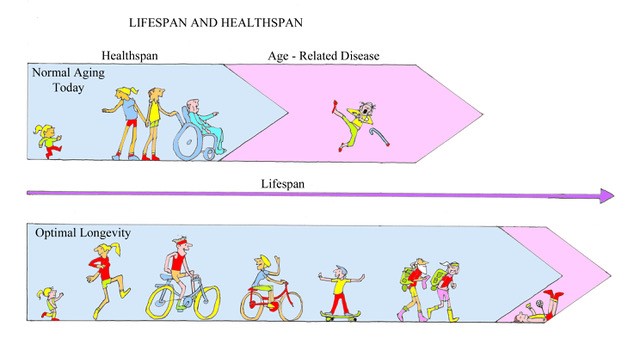HEALTHSPAN VERSUS LIFESPAN
The Government has recently published its Green Paper: “Advancing our health: Prevention in the 2020s – consultation document.” The Green Paper has already been fairly extensively criticised for failing to tackle such problems as the root causes of ill health, including poverty and deprivation, poor housing, poor quality work, social isolation, poor quality environments, obesity and damage from alcohol. I have a different criticism – the lack of attention given to physical activity as a tool for health promotion.
End-of-life disability
One excellent feature of the Paper is the recognition of the concept of “Healthspan” – the duration of healthy living. This is very different to Lifespan which is total life expectancy and is made up of Healthspan to which must be added the period of poor health at the end of life. To my mind, Healthspan is much more important than Lifespan. The current estimate is that today over 20% of Lifespan is expected to be spent in poor health. This means that the last 16 years of life for men and the last 19 years for women are marred by disease and disability.
The Green Paper makes a number of suggestions for increasing Healthspan and decreasing frailty of old age but has a disappointingly short section on physical activity. This is despite quoting the Chief Medical Officer: “If physical activity were a drug, we’d talk about it as a miracle cure”.
How much exercise do you take?
It goes on to state that a third of adults do not meet the government’s exercise guidelines of 150 plus minutes of aerobic activity a week. This is a hopelessly optimistic assessment, based on questionnaire surveys. When people’s activity levels are actually measured the real figure revealed is that more than seventy five percent do not meet the guidelines. Self-deception is a powerful force, influenced as it is by “social desirability bias”.
A disturbing association reported in the Green paper is the relationship between lower social class and reduction in both Healthspan and Lifespan. The most deprived have a shorter Lifespan and a longer period of end-of-life disability than the least deprived. For the most deprived, length of life is expected to be 78.7 years with the period of disability of 26.7 years. For the least deprived, the figures are 86.2 and 15.9 years. In other words, the poorer you are, the shorter is your life but the longer your period of disease and disability at the end of life. It reminds me of the words of Jesus quoted in Luke: “I tell you that everyone who has will be given more; but the one who does not have, even what he has will be taken away from him.”
I am sure that the best way to increase Healthspan (and Lifespan) is to increase physical activity. Almost all of the diseases of middle and old age which lead to frailty and end-of-life disability are promoted by lack of exercise and low levels of physical fitness. Even the social inequalities mentioned above are mirrored by the levels of leisure time physical activity – the more deprived take much less exercise than the least deprived.
- Department of Health and Social Care. Advancing our health: prevention in the 2020s—consultation document. Jul 2019. https://www.gov.uk/government/consultations/advancing-our-health-prevention-in-the-2020s/advancing-our-health-prevention-in-the-2020s-consultation-document
Subscribe to the blog
Categories
- Accelerometer
- Alzheimer's disease
- Blood pressure
- BMI
- Cancer
- Complications
- Coronary disease
- Cycling
- Dementia
- Diabetes
- Events
- Evidence
- Exercise promotion
- Frailty
- Healthspan
- Hearty News
- Hypertension
- Ill effects
- Infections
- Lifespan
- Lipids
- Lung disease
- Mental health
- Mental health
- Muscles
- Obesity
- Osteoporosis
- Oxygen uptake
- Parkinson's Disease
- Physical activity
- Physical fitness
- Pregnancy
- Running
- Sedentary behaviour
- Strength training
- Stroke
- Uncategorized
- Walking



The most deprived often live in areas where low cost exercise ie: walking is more of a chore than fun, with only pavements to walk on and no green spaces without traffic pollution nearby.
They are more likely to live in high-rise flats and only lifts to get up & down.If stairs are available they may be avoided in case of aggressive attacks.
Deprivation is a cause of depression which is a cause of inactivity.
Exercise opportunities for exercise provided by clubs or Sports Centres incur charges and may be difficult to access geographically.
The words of Jesus are very apt because the least deprived can overcome all these potential difficulties far easier than the most deprived.